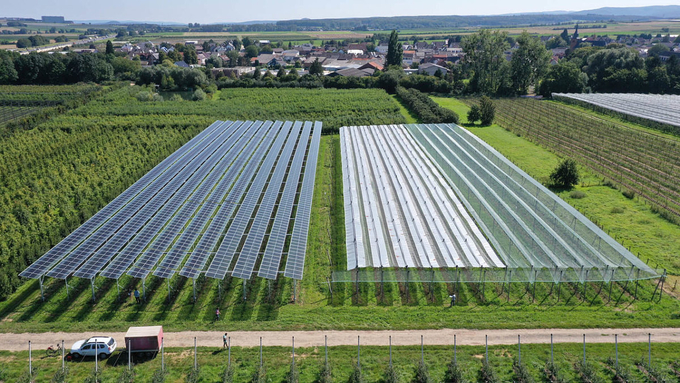May 22, 2025 | 13:47 GMT +7
May 22, 2025 | 13:47 GMT +7
Hotline: 0913.378.918
May 22, 2025 | 13:47 GMT +7
Hotline: 0913.378.918

BayWa r.e. agrivoltaic project.
Among the main factors behind this choice, the researchers identified the additional source of income coming from solar power generation and the perceived usefulness of the technology.
Researchers at Germany's Fraunhofer Institute for Solar Energy Systems (Fraunhofer ISE) and the University of Goettingen conducted a survey to understand which factors may motivate German farmers to build agrivoltaic facilities and found that their vast majority is considering this option.
“Previous literature already found that farmers have a keen interest in using agrivoltaics,” the scientists explained. “However, the perception of agrivoltaics depends on the perceived feasibility and usefulness of the technology. Currently, there is a high degree of uncertainty surrounding agrivoltaics as it is still perceived to be in the early stages of development.”
The main question at the center of the survey was “In principle, would you be willing to use an agrivoltaic system on your farm?” It was also based on a technology acceptance model that takes into account the “perceived usefulness” and “perceived ease of use” of a given technology. The former describes the extent to which a person feels that its work performance is enhanced by a given technology and the latter describes the extent to which a person perceives that the use of a technology is effortless.
The survey also considered factors such as risk tolerance, innovativeness, level of knowledge, environmental awareness, climate change impact, energy price impact, and subjective norm. The latter refers to the perceived social pressure coming from influential people.
The scientists explained that the survey was carried out in February 2023 and based on the answers of 214 valid respondents, with the survey's completion rate reaching 66.7%. “To find out which factors influence the probability that farmers want to use agrivoltaics on their farms, binary logistic regression was applied,” they emphasized. “The eight factors extracted from the factor analysis are included as independent variables to explain farmers' decision behavior.”
The analysis showed that the most important factors motivating the adoption of an agrivoltaic solution among German farmers are the additional source of income coming from solar power generation, the “perceived usefulness” of the technology, and the “subjective norm.” It also showed that 72.4% of farmers are willing to use agrivoltaics.
The results of the research were introduced in the paper “Factors influencing the willingness to use agrivoltaics: A quantitative study among German farmers,” published in Applied Energy.
“While the research indicates relatively minor doubts about the technology and its economic benefits, the bureaucratic hurdles associated with construction represent a significant barrier,” the research team emphasized. “Importantly, the results reveal a nuanced perspective on the protective functions of agrivoltaics, which farmers only partly recognize. This may arise from the need for additional scientific and practical evidence showcasing the technology's potential to provide protection and synergies for agricultural practices.”
(PV)

(VAN) Attempts to bring down the price of the Japanese staple have had little effect amid a cost-of-living crisis.

(VAN) Fourth most important food crop in peril as Latin America and Caribbean suffer from slow-onset climate disaster.

(VAN) Shifting market dynamics and the noise around new legislation has propelled Trouw Nutrition’s research around early life nutrition in poultry. Today, it continues to be a key area of research.

(VAN) India is concerned about its food security and the livelihoods of its farmers if more US food imports are allowed.

(VAN) FAO's Director-General emphasises the need to work together to transform agrifood systems.

(VAN) Europe is facing its worst outbreak of foot-and-mouth since the start of the century.

(VAN) The central authorities, in early April, released a 10-year plan for rural vitalization.